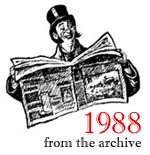
Preachers and Politics
HARVARD DIARY
When I was a boy I remember my mother reading The Catholic Worker, paying much attention to the message Dorothy Day and Peter Maurin offered — an everyday kind of Christianity meant to be lived in the secular world, and a Christianity with decidedly political concerns: to lobby, picket, protest, to stir up others in support of this, against that. I also remember my father listening on Sunday afternoon to the speeches of a Catholic priest from some place called Royal Oak, Michigan: Father Charles Coughlin. My mother disliked him, called him a “rabble-rouser.” My father disliked him, called him “dangerous” — yet listened to him every week, and, I could tell, was somewhat fascinated by his passionate oratory.
I was six or seven, but I sure recall my father telling my mother that Father Coughlin was “saying things” a lot of people think, but don’t dare express. I recall, too, asking my father himself to “say things” — to spell out what he had just somewhat cryptically mentioned. But he wouldn’t, nor did my mother want him to. Children, of course, often suspect there is more to say, so to speak, than gets said — and are often disappointed after their push for candor.
Years later, in college, I encountered Father Coughlin again — now in a history course taught by a young assistant professor who was much interested in “populism”: the yearnings and fears and resentments of ordinary, so-called working-class people. We read C. Vann Woodward’s Tom Watson: Agrarian Rebel. We read Millhands and Preachers and All the King’s Men. We read William Carlos Williams’s Paterson — his fiery blasts at the university world, with all its proud gentility and, not rarely, pietistic egoism. We also read about Father Coughlin and others who criticized the New Deal or corporate America from one or another angle of vision, whether of the “right” or the “left.”
You May Also Enjoy
What ever our motives, problems, conflicts, our secret and not so secret passions, the real moral test of our worth has to be what we do with ourselves in the course of our everyday lives.
In our parlors, with our educated tongues, we deplore not only the Swaggarts of this world but all who attend them, and all who aren't quite "up" to us.
Among the hilltop beatitudes Jesus gave us, the one that clouds the distinction between transgressors…

